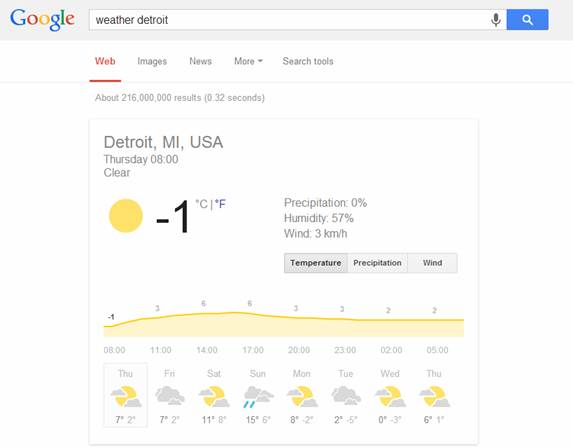If there is one thing that Google prides itself with, it’s that they work their hardest to ensure that their users are finding the most relevant, updated answers to their queries. This means constant updates to the algorithms and a dedicated spam fighting team, which tries to always stay one step ahead of the Black Hat SEO tactics. The results have often been frustrating to web owners and SEO’s alike, as updates, such as Panda and Penguin, may have had a negative effect on their Google rankings for their specific keywords.
Over the past several months, it seems that Google has been providing searchers with answers to some queries directly on the search page. The person searching for something is obviously thrilled with update, because it eliminates one step on the search for answer – clicking the link and actually going the website for the answer. While this is great news for the regular Joe, it is a nightmare for web owners who depend on clicks and web traffic for their revenue stream.
Google has slowly started rolling this out, probably over a year ago I think the first time I saw it was when I asked what “15 percent of 365” and I was surprised to get a direct answer. Over the following few months, I started seeing It more and more. Google a celebrity, athlete famous person and odds are you’ll see their bio pop up on the right panel. If you are looking for a list of movies by a specific actor, or books by an author, a simple Google search will typically give you a result similar to the image below. No need to go to IMDB.com or a site similar to it.

When searching for the weather forecast, the graphic is so large that there are no organic results on the page.

As I mentioned above, the particular graphics aren’t that new, but lately Google has increased the kinds of answers that it will give in these information card. After Hummingbird, the latest Google update, it’s being recommended that your content should be optimized to answer questions rather than target keywords. This makes sense, since of the major changes to the algorithm is a focus on long tail searches rather than just one or two keywords. But from a more sinister point of view, Google is now crawling pages and pages of high quality answers to all kinds of questions, and they can use that content as they see fit.
For example, search for “How to lose weight” What you see below are 3 Google ads, then a Google card with three answers, all from large corporate sites. There were no organic results on the top half of the page.

To be honest, these answer cards don’t seem to be the standard just yet, I googled a bunch of different question, hoping to find more samples, but came up empty. But as we’ve seen in the past from Google, they rarely just make an update and leave it. They slowly roll it out, and are constantly tweaking their algorithm until it reaches perfection.
In my opinion there are two reasons why Google wants to provide as many answers on-page as possible. The first is what I mentioned above; it’s much faster from the users point of view to get answers to their questions. Secondly, from a business perspective, the farther down the organic results get pushed, the Google ads, which remain on the top of the page, will have more value.
It’ll be interesting to see how this unfolds over the next couple months and see if indeed there is true damage done to organic search, and how the online marketing community will respond.

Shauli Zacks is the SEO team leader at Somoto, a software monetization company, located in Israel. When he isn’t in front of the computer Shauli can be found relaxing at home with his family.



